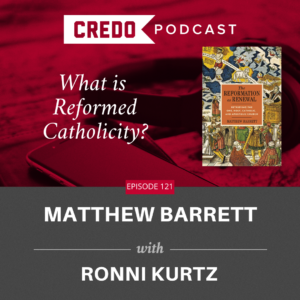Show Notes

In episode 5 of this mini-series, Ronni Kurtz asks Matthew Barrett, author of the new book The Reformation as Renewal, whether a self-conscious reformed catholicity defined those like Zwingli, Bullinger, Bucer, and Calvin. Barrett also contrasts this reformed catholicity with those Radicals who abandoned catholicity in the name of primitive Christianity. And he sheds some new light on Bucer’s attempts to arrive at a Protestant unity that oscillates on catholicity. Barrett and Kurtz demonstrate that reformed catholicity should influence how we today understand everything from scripture and the creeds to ecclesiastical authorities and confessions.
Matthew Barrett is the editor-in-chief of Credo Magazine and host of the Credo podcast. He is professor of Christian theology at Midwestern Baptist Theological Seminary and Director of the Center for Classical Theology. He is the author of the award-winning Simply Trinity and his new book is called, The Reformation as Renewal (Zondervan Academic). He is currently writing a Systematic Theology (Baker Academic).
Ronni Kurtz serves as Assistant Professor of Theology at Cedarville University. Previously, he taught theology at Midwestern Seminary and Spurgeon College in Kansas City, Missouri, where he also pastored for eight years. He is the author of several books, including Fruitful Theology: How the Life of the Mind Leads to the Life of the Soul. You can follow him on Twitter at @RonniKurtz.